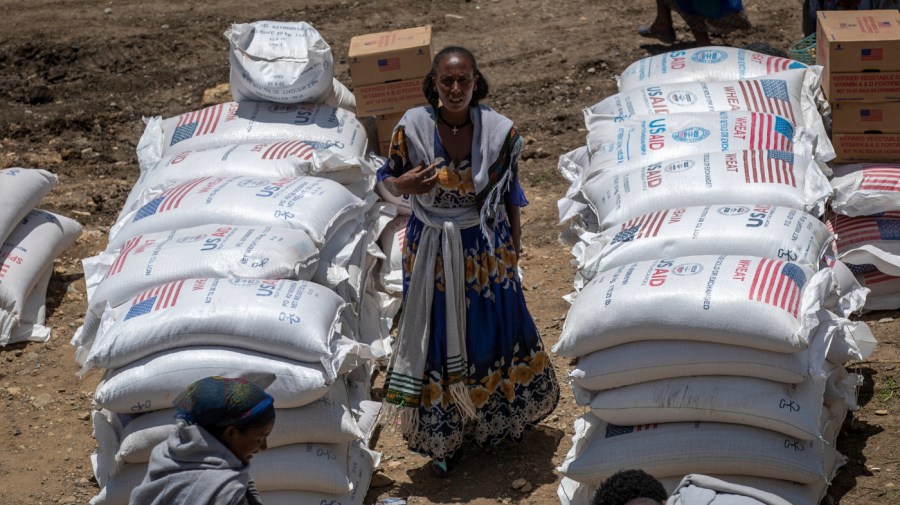
President Trump’s characterizations of the U.S. Agency for International Development and Elon Musk’s efforts to abolish it have resurrected painful memories. Hearing a president say that the agency is wracked with “fraud” and run by a bunch of “radical left lunatics” was enough to put me in a fighting mood.
As the administrator of the agency in the early 90s, I resisted Sen. Jesse Helms’s (R-N.C.) attempt to eliminate its independence and merge it into the State Department. The result of that earlier battle was a stronger agency and one whose independence was affirmed by statute. Although it was now a statutory agency, as before, it operated under the foreign policy guidance of the secretary of State.
There is an “Alice-in-the-looking-glass” quality to Trump’s and Musk’s charges, because in truth, no agency in the government has more oversight than USAID.
USAID’s programs are audited constantly. An active agency inspector general and inspector general staff are constantly on the lookout for fraud. Congress’s investigative arm, the General Accountability Office conducts periodic surveys. A large legal staff assures that the laws are followed. Fraud is very rare even though the agency works in difficult environments.
The State Department adds yet another bureaucratic layer of oversight. A foreign assistance bureau at State assures that USAID’s programs are consistent with an administration’s foreign policy. And the State Department allocates funds from its own Economic Support Fund to USAID to carry out programs directly related to shorter-term foreign policy objectives.
It is quite ironic to hear the agency characterized as operating without constraint. It has more often been called overly bureaucratic and risk-averse. The programs that USAID implements are for the most part earmarked by Congress and its budget submissions are approved by the State Department and the White House Office of Management and Budget.
USAID missions attempt to address the needs of our partner countries while advancing sound development effectiveness principles. Aid budgets are based initially on an embassy country team recommendation and then are coordinated closely with the State Department’s regional bureaus. Congress then adds its approval, often in the form of earmarked programs.
Every new administration seeks to fashion the foreign aid program to fit its overall ideological focus. A Republican administration might prefer to use phrases like “economic growth.” Whereas a Democratic one might emphasize “poverty reduction.” The current administration seems more concerned about initiatives that they characterize as “woke.”
The goal is similar: Help your partner strengthen the micro-economic and governance systems that attract investment and create jobs. The agency measures results and when there is success U.S. national interests are served. Healthy societies reduce migration, avoid violent conflict and contribute to peace, prosperity and security.
Sustaining progress also means creating institutions that contribute to accountable government. America has always been a beacon for freedom and democracy and our partnerships abroad are infused with those values.
Our active involvement in the development of a country that suffers from the effects of poverty counters the efforts of authoritarian governments like China to buy influence. No doubt China would be delighted to see USAID abolished.
President George W. Bush promulgated a national security strategy that was based on what he called the “three Ds.” Defense, diplomacy and development.
The presidents that succeeded him embraced that concept and a bipartisan coalition has strongly supported it. When there was an effort to severely reduce the foreign aid budget in the first Trump administration, the bipartisan coalition held and development was fully funded.
There is clearly a humanitarian aspect to our work in developing countries. We provide relief after disasters and help nations transition from violent conflict.
Reducing the effects of poverty saves lives. Poverty breaks down the glue that holds societies together. Multiple peer-reviewed studies show a direct correlation between abject poverty and state failure. In this sense, an investment in development is an investment in the prevention of conflict.
Our foreign aid programs protect Americans from the consequences of poverty: infectious disease, migration, environmental degradation and global terrorism. These issues animated the last presidential campaign. It is therefore sadly ironic that we would even contemplate the elimination of a vital tool in combating these threats.
On Wednesday, I joined a group of bipartisan former USAID administrators to release a statement emphasizing the urgency of the issue.
“Failure to maintain the global engagement that foreign aid enables, to honor the men and women of our civilian service as we do those in the military or weaken and even destroy the agency is to the benefit of neither political party and the detriment of all Americans,” it reads.
The effort to reduce poverty and save lives is not ours alone. Ever since the days of the Marshall Plan, the United States has been a leader in the global effort to pull nations out of poverty. The richer countries all contribute some even 0.7 percent of GDP (the United Nations goal).
This burden-sharing has made nearly $230 billion available annually in the form of official development assistance. That investment in turn has produced more than $1 trillion in foreign direct investment. As risks are eliminated through development work, the private sector sees opportunities for safe investments.
Without foreign assistance, the world would be in an even more dangerous state. The operations of the U.S. Agency for International Development can always be improved. But the agency cannot be replaced without seriously damaging American interests.
J. Brian Atwood was the administrator of USAID during the Clinton administration.











